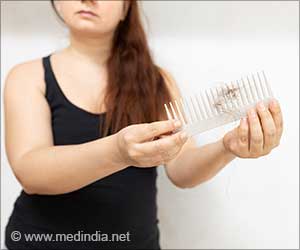Insulin, produced by the pancreas, is a vital hormone that regulates blood glucose levels and helps store glucose in the liver, fat, and muscles. It is responsible for managing the body’s metabolism of carbohydrates, fats, and proteins. IGF-1, on the other hand, works in conjunction with the growth hormone (GH) and is naturally present in the bloodstream. It plays a significant role in tissue and bone growth and regulates cell proliferation and migration during hair follicle development.
Dr. Manickam highlights that if waist circumference exceeds 90 cm in men and 80 cm in women, it contributes to belly fat. He suggests that observing someone with a protruding belly is often indicative of a 90% likelihood of that person experiencing hair loss.
Role of Lifestyle Factors in Hair Growth
Apart from nutrition, engaging in 150 minutes of exercise per week is crucial for efficient insulin function, according to Dr. Manickam’s recommendations. Exercise helps maintain a healthy weight and supports proper insulin functioning, which indirectly influences IGF-1 levels and hair growth.
Advertisement
Dr. Navya Handa, a consultant dermatologist and cosmetologist at Primus Super Speciality Hospital in New Delhi, further emphasizes that excess belly fat can serve as a signal of an unhealthy lifestyle, potentially contributing to hair loss. Hormonal imbalances play a significant role in hair loss, and increased belly fat can elevate dihydrotestosterone (DHT) levels, leading to the shrinking of hair follicles and subsequent hair fall.
Additionally, an unhealthy diet and lifestyle can lead to nutrient deficiencies, such as iron and biotin, which are essential for healthy hair growth. Inadequate levels of these nutrients can result in weak, brittle hair that is prone to falling out (3

Influence of Nutrition, Food Supplements and Lifestyle in Hair Disorders
Go to source).
READ RELATED: Brain Tumour Symptoms: 10 Unusual Signs That May Appear on Eyes And Face
Stress is another common factor associated with hair loss, and excess belly fat can be an indicator of chronic stress. Dr. Handa explains that elevated stress levels disrupt the hair growth cycle, potentially leading to hair loss. While belly fat may not directly cause hair loss, it can serve as a visible sign of an unhealthy lifestyle that contributes to hair loss.
Managing Hair Loss and Promoting Healthy Hair Growth
Maintaining a healthy weight, adopting a balanced diet, and effectively managing stress levels are crucial steps toward promoting healthy hair growth. Dr. Handa emphasizes the importance of addressing lifestyle factors to prevent hair loss and support hair health.
By adopting a healthy lifestyle that includes regular exercise, a nutrient-rich diet, stress management techniques, and adequate rest, individuals can improve insulin functioning, regulate hormonal balance, and reduce the likelihood of hair loss. It is important to note that consulting with a healthcare professional or dermatologist specializing in hair loss is advisable for a personalized assessment and guidance tailored to individual needs.
References:
- Obesity accelerates hair thinning by stem cell-centric converging mechanisms – (https://pubmed.ncbi.nlm.nih.gov/34163066/)
- Effects of insulin and insulin-like growth factors on cultured human hair follicles: IGF-I at physiologic concentrations is an important regulator of hair follicle growth in vitro – (https://pubmed.ncbi.nlm.nih.gov/8006448/)
- Influence of Nutrition, Food Supplements and Lifestyle in Hair Disorders – (
Source: Medindia






